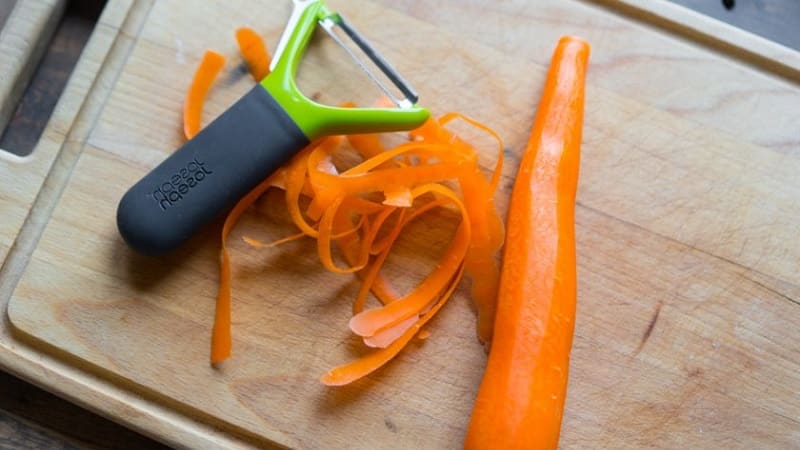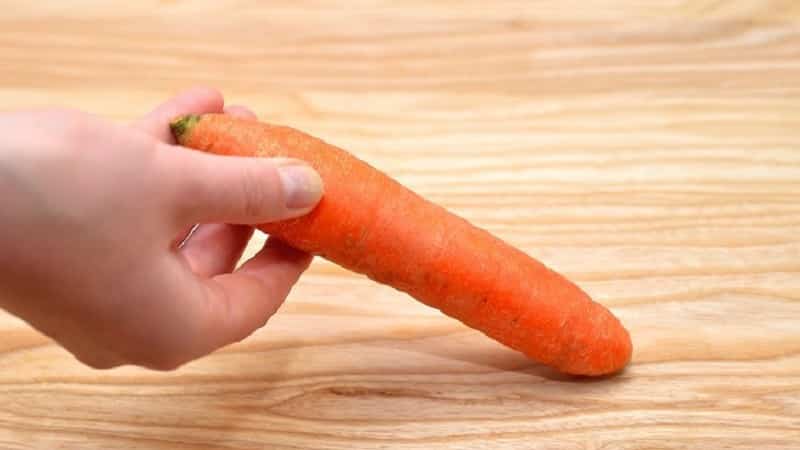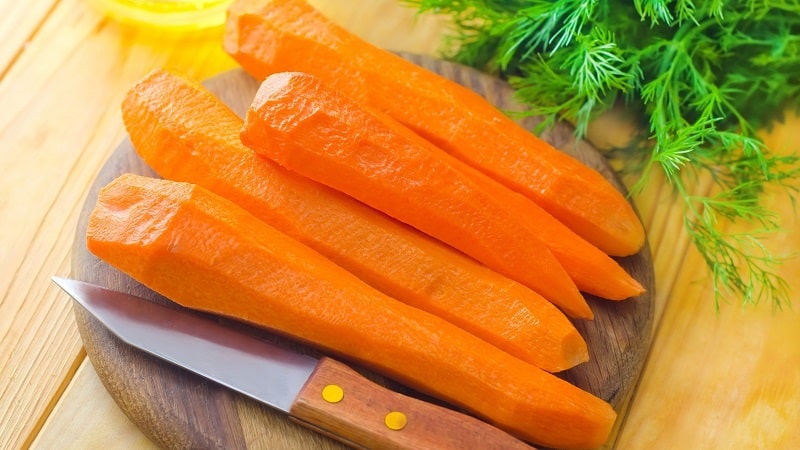Reasons for carrots turning black after peeling and what to do about it
Carrots are a healthy vegetable and an ingredient in numerous dishes. If the product is healthy and fresh, it will have a bright orange color after cleaning. But sometimes grated or peeled carrots turn black and lose their usual taste. From the article you will learn why this happens and what to do about it.
Reasons why carrots turn black after peeling
Darkening of vegetables after peeling occurs for various reasons.. Of these, only one can be called harmless - oxidation. In other cases, it is not recommended to store or eat blackened carrots.

Oxidation
The minerals that make up carrots are oxidized when exposed to oxygen. and turn black. Beta-carotene is the pigment responsible for the orange color of the vegetable. It quickly oxidizes when exposed to air and loses its original orange color.
Excess fertilizer
Another reason carrots darken after peeling — too much fertilizer was used when growing it. Such a vegetable cannot be called healthy.
Take note:
Delicious and healthy carrot-apple juice
Improper cleaning
Peeling with a dull knife and removing too thick layers of skin lead to blackening of the root crop.
Storage errors
Not all carrot varieties are suitable for long-term storage. Varieties such as Chance, Moscow, Samson, Dolyanka, Touchon, Dordogne, Champion are more resistant to diseases and pests and persist throughout the season. However, there are varieties that deteriorate when stored for a long time and darken when cleaned.
Important! Under incorrect storage conditions (temperature above 28°C, humidity 90-100%), carrots develop black rot. The symptoms of this disease are as follows: dry, dark and depressed spots are visible on infected specimens. Dead tissue turns black over time. And the stain itself penetrates 1-1.5 cm deep into the pulp and has clear boundaries. A dark olive-colored coating of fungal mycelium remains on the spots.
Why do grated carrots turn dark?
Instant blackening of grated carrots is rare. If the fruit was initially whole, without cracks or brown spots, it will oxidize when rubbed. The product may darken if the root crops showed signs of past diseases or pests. The consumption of such carrots is strictly contraindicated.
Causes of darkening during cooking
When cooked, a vegetable darkens if it was cooked in the same pan along with other vegetables.: potatoes, beets, etc. The structure of the vegetable absorbs the coloring enzymes of other vegetables and darkens. There is nothing wrong with this - such a vegetable is suitable for cooking.
After washing
Dark spots on washed carrots indicate disease, which were not visible externally due to contamination. Such diseases include black, white, gray rot, brown spot or phomosis. Diseased root vegetables cannot be stored or processed.
What to do
Carrots that turn black after peeling or washing are thrown away. Darkening of the fruit indicates a loss of taste and beneficial qualities, the presence of excess nitrates in the product and tissues that have suffered from the disease. Darkened vegetables are not processed.Removing the darkened parts is also of no benefit, since the painful blackening damages the entire fruit.

Is it possible to eat these carrots?
If the reason for the blackening of the vegetable was improper storage, then the product is no longer suitable for food, and must be recycled. It does not preserve valuable substances - at best, it will simply be useless.
Storing carrots too long poses a health risk: when consumed, poisoning occurs.
Vegetables grown with multiple chemicals and other fertilizers are definitely not suitable for food.
Carrots that have darkened due to oxidation are used for cooking or freezing.
Preventive measures
To prevent carrots from turning black, it is recommended to follow preventive measures:
- buy only high-quality vegetables from trusted manufacturers or distributors;
- choose vegetables of medium weight - about 150 g: such a fruit has the optimal presence of valuable minerals and vitamins, and the content of harmful substances is minimal;
- root vegetables that are too large accumulate nitrates and do not benefit the human body;
- When peeling carrots, remove a thin layer of skin with a sharp knife or vegetable peeler;
- cook separately from other root vegetables and do not overcook;
- to preserve vitamins, immerse carrots in boiling water;
- It is recommended to cook and stew the vegetable under a closed lid;
- for storage, choose vegetables that are not damaged and store them in the right conditions;
- do not store peeled carrots for a long time - to prevent the product from spoiling, grate it, place it in a plastic container or vacuum bag and freeze it;
- Remove the tops immediately after harvesting.

Storage tips
Unpeeled to avoid rotting carrots stored in a cool place at a temperature from 1 to 3°C and humidity not more than 80%. A cellar or refrigerator is suitable for this purpose. It is placed in the cellar in open boxes made of plastic, wood or in plastic bags with holes. Any containers in which carrots are stored for a long time must be ventilated.
In a refrigerator the root vegetable is wrapped in cling film or parchment paper and placed in the department for storing vegetables and fruits. In cool conditions, carrots are edible for 2 months, after washing whole fruits - 1-2 weeks.
Healthy and whole vegetables are selected for long-term storage. If there are a lot of them, before storing them in storage, the root crops are sprinkled with chalk dust or placed in a container with sand and chalk (in a 1:1 ratio). In this state, carrots do not spoil all winter.
Important! In the fruit and vegetable department, carrots are stored separately from apples, cabbage and tomatoes. Shared storage speeds up the process of product spoilage.
Grated or chopped vegetables can be stored in the refrigerator for 2 days.. Frozen - one year. The culture cannot be defrosted and frozen again: it loses most of its beneficial qualities.
Conclusion
After peeling or heat treatment, for certain reasons, carrots turn black and lose their taste. To avoid this, you should follow the recommendations for storing and preparing this vegetable. Keep the fruit in a cool room; when peeling, cut off a thin layer of skin with a sharp knife. When growing carrots in your own garden, excess fertilizer is dangerous.
Buy carrots only from trusted manufacturers in reliable stores and do not store root vegetables for too long indoors.